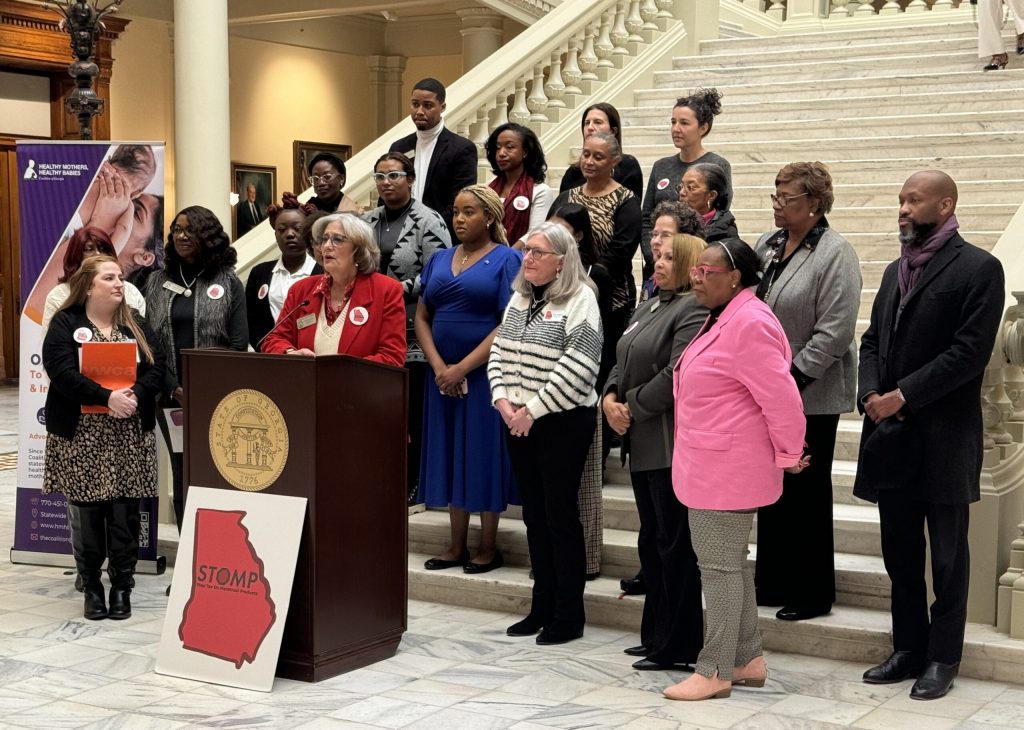Opponents of sales tax on period products ready to push Georgia lawmakers to end levy

Rep. Debbie Buckner, a Junction City Democrat, makes the case for eliminating the state sales tax on period products at a press conference held Thursday. Jill Nolin/Georgia Recorder
A national tax policy group last year ditched the phrase “feminine hygiene products” and adopted “menstrual discharge collection devices” as its go-to term for tampons and other period products.
The Streamlined Sales Tax Governing Board took up the issue in response to major retailers who operate in multiple states, where questions have at times emerged over why male hygiene products were being taxed.
Craig Johnson, who is executive director of the group, which works with member states like Georgia to smooth out the complexities found in the patchwork of state sales tax systems, said the goal was uniformity.
“We stay out of setting the tax policy. We want that to be up to the policymakers in each state,” Johnson said in an interview Thursday. “But if they do go down that path, we want them to use the uniform definition so that it makes it easier for retailers.”
Advocates in Georgia who have pushed for years for Georgia to stop charging a 4% sales tax on period products are now pointing to this subtle change as reason for action this session.
A group of advocates and Democrats participated in a press conference Thursday at the state Capitol, calling for the end of what they called a discriminatory tax. They argue there is no equivalent tax on men and that foregoing the tax paid by women and girls would not make a dent in state revenues. About $6 million is collected each year, according to Georgia STOMP.
Claire Cox, who serves as chair of Georgia STOMP, which stands for “stop tax on menstrual products,” argues that the updated term should address any concerns that exempting period products would open the floodgate to other tax exemption requests.
“We just think it’s time for Georgia to modernize our tax code,” Cox said. “This is not a red or blue issue. It never has been.”

Jhanai Gates, Sheridan Lyles and Sydney Wilson pose for a photo Thursday at the state Capitol. Jill Nolin/Georgia Recorder
Georgia is also becoming part of a shrinking number of states that still tax products that women purchase every month to manage their menstrual cycle, which advocates argue should be treated as medical devices. Items like insulin syringes and testing strips are already exempt from the state sales tax in Georgia.
When Cox and others started advocating to eliminate the tax seven years ago, 14 states were not charging a sales tax on period products. Now, that number is up to 29.
“It shouldn’t matter what your ZIP code is as to whether you pay taxes on a medically necessary device needed for good health,” Cox said.
State Rep. Debbie Buckner, a Junction City Democrat, says she believes the tax was unintentionally left on period products when Georgia nixed its sales tax on groceries in the 1990s.
“There were no women in the room, and no offense to men, I just don’t think they thought about it,” Buckner said Thursday. “Now is the time to fix that. We give tax exemptions to planes, to boats, why not to women?”
There are two bills left pending from last year that would eliminate the tax. A Senate bill received a hearing last year but no vote was taken. A House bill is sponsored by Savannah Republican Rep. Ron Stephens and has sponsors from both parties, including Buckner.
Instead, Georgia has set aside money in the state budget for public health and public education to distribute period products to low-income women and girls.
Young advocates from Gwinnett County who were at the state Capitol Thursday said they were encouraged by the signs of progress on the issue.
Rhea Sethi, president at PERIOD of North Gwinnett High School, said her high school club was grown in popularity after being initially seen as an odd extracurricular when the group formed just two years ago.
Last year’s Senate hearing, where the previous club president spoke, elevated an issue that some were quick to dismiss and raised the club’s profile on campus, Sethi said. They went from seeing boys tearing apart tampons in class to having about 100 high schoolers join their ranks.
Sethi said the group works to raise awareness about period poverty – or the lack of access to products – and how it can cause their peers to miss school. The club works to raise funds to purchase products to stock classrooms, bathrooms and other places that provide easy and comfortable access.
“The whole point was to show that we were serious about what we’re doing. This issue is vital,” Sethi said. “It’s ok to talk about it. It’s ok to get involved.”
SUPPORT NEWS YOU TRUST.
The post Opponents of sales tax on period products ready to push Georgia lawmakers to end levy appeared first on Georgia Recorder.




